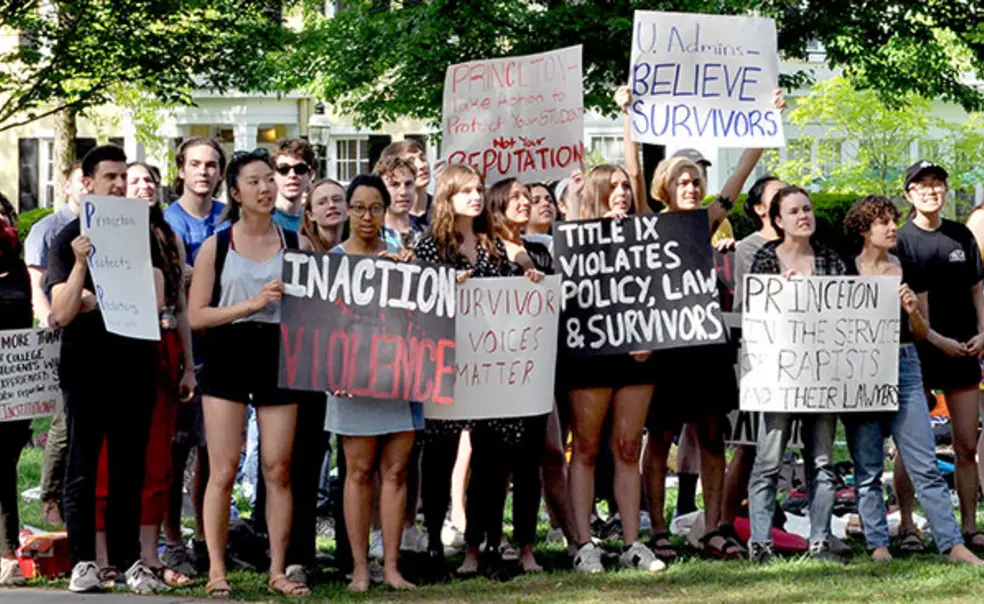Title IX Protest
Sit-in on front campus seeks to reform handling of sexual-misconduct cases
A nine-day student protest in front of Nassau Hall last month of Princeton’s sexual-misconduct policies has prompted the University to authorize an external review of the Title IX processes and to schedule meetings with protesters over the summer.
After meeting privately with a small group of protesters, President Eisgruber ’83 said in a statement that “sexual misconduct has no place at Princeton, and the University remains firmly committed to making its campus safe.
“We value student views about how to achieve that goal,” he said, adding that policy changes “must take place through this University’s governance processes ... in a way that is deliberative, well-informed, fair, and open to all views and perspectives.”
Student protesters attended a joint meeting of two faculty-student committees that could play a role in revising disciplinary procedures, and further such meetings are planned during the summer.
The two committees anticipate completing a final report in the fall, the University said, but any possible recommendations could be affected by new regulations for handling sexual-misconduct matters expected to be issued by the U.S. Department of Education.
As this issue of PAW went to press, a presence by protesters at the P-rade June 1 was also being discussed.
The sit-in, in which students maintained a round-the-clock presence on the lawn in front of Nassau Hall in often cold and rainy weather, ended May 15 after 200 hours.
Vice Provost Michele Minter, Princeton’s Title IX coordinator, requested an outside review of the program, saying it could “strengthen trust” in the University’s process. Eisgruber approved the request for a review, which will be overseen by Provost Deborah Prentice.
The protest was triggered by University disciplinary action May 2 against a student, described as a sexual-assault victim in media accounts, who was found responsible for writing “Title IX protects rapists” on campus walkways in April. The student was assessed a penalty of four semesters of academic probation, 50 hours of community service, and a $2,722 fine due May 17.
News of the disciplinary action sparked a GoFundMe campaign May 3 that asserted: “The University is taking damages to its property far more seriously than it took the sexual assault suffered by this survivor and many others.” The campaign quickly raised more than enough funds to cover the student’s fine. (A University spokesman said penalties for vandalism may include suspension or probation, campus service, and restitution “tied directly to the cost of repairing the damage to University property.”)
As discussion of Title IX issues grew across campus, a group named Princeton Students for Title IX Reform — later changed to Princeton IX Now — called a protest against procedures that it said “re-traumatize those who have survived violence by subjecting them to grossly misrepresented and subpar procedures.”
The group presented a list of demands, including an external review of the Title IX system, a group of social workers who would help students in Title IX cases, an alternative restorative-justice track for survivors, and departmental status for the Program in Gender and Sexuality Studies.
The group posted accounts online from more than 30 anonymous students and Princeton employees about their personal experiences with Title IX. It also started a petition at change.org, where more than 1,230 students and alumni pledged not to take part in Annual Giving until sexual-misconduct procedures are revised.
A faculty petition of support, urging the administration “to take seriously” the students’ call for reforms, was signed by more than 115 professors and postdocs.
Jamie O’Leary ’19, a member of Princeton IX Now, said the protest had taken students away from “final papers, exams, sleep, post-thesis life, end-of-year celebrations,” and while the sit-in had ended, the group would continue “to fight for survivors on Princeton’s campus.”












1 Response
Norman Ravitch *62
6 Years AgoAlma Mater? Or Parole Officer?
I know nothing about this issue and wish to know even less! A university is ill-equipped for such problems and should leave them to the city police. The young have always misbehaved and in medieval Europe, students were given benefit of clergy, like clergy today: cover-ups of all sorts to hide pedophilia, sexual abuse, and simple rape. The ecclesiastical courts were then as now very lenient and understanding that sinners will sin. Today's university cannot offer this benefit of clergy.